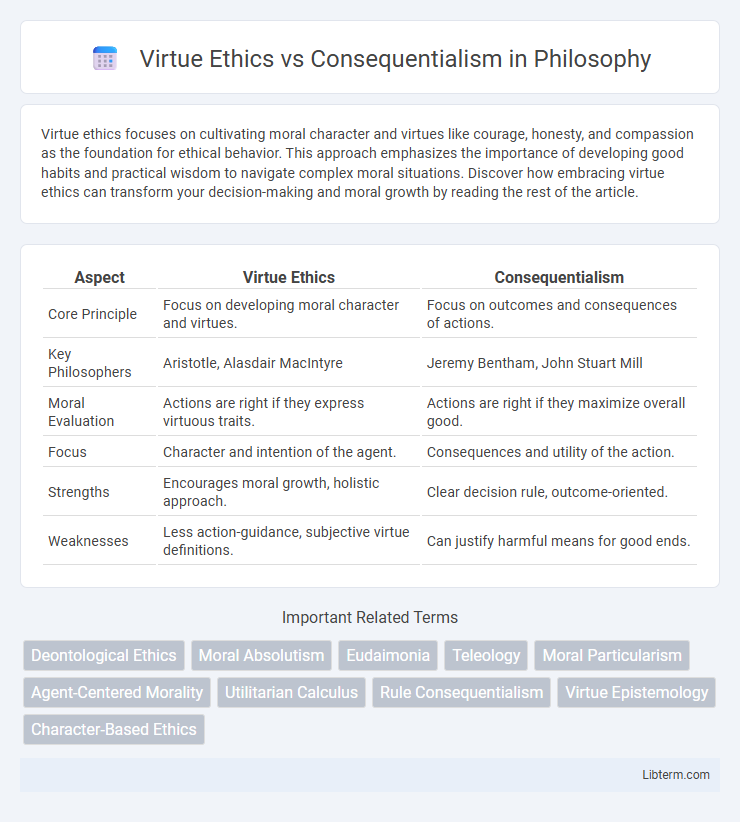Virtue ethics focuses on cultivating moral character and virtues like courage, honesty, and compassion as the foundation for ethical behavior. This approach emphasizes the importance of developing good habits and practical wisdom to navigate complex moral situations. Discover how embracing virtue ethics can transform your decision-making and moral growth by reading the rest of the article.
Table of Comparison
| Aspect | Virtue Ethics | Consequentialism |
|---|---|---|
| Core Principle | Focus on developing moral character and virtues. | Focus on outcomes and consequences of actions. |
| Key Philosophers | Aristotle, Alasdair MacIntyre | Jeremy Bentham, John Stuart Mill |
| Moral Evaluation | Actions are right if they express virtuous traits. | Actions are right if they maximize overall good. |
| Focus | Character and intention of the agent. | Consequences and utility of the action. |
| Strengths | Encourages moral growth, holistic approach. | Clear decision rule, outcome-oriented. |
| Weaknesses | Less action-guidance, subjective virtue definitions. | Can justify harmful means for good ends. |
Introduction to Virtue Ethics and Consequentialism
Virtue Ethics centers on character development and moral virtues such as courage, honesty, and compassion, emphasizing the importance of becoming a virtuous person rather than merely following rules. Consequentialism evaluates the morality of actions based on their outcomes, with utilitarianism being a prominent form that seeks to maximize overall happiness or utility. Both ethical frameworks provide distinct approaches to moral decision-making, one prioritizing internal character traits and the other focusing on external consequences.
Historical Origins and Philosophical Background
Virtue ethics traces its origins to ancient Greek philosophers like Aristotle, who emphasized character and moral virtues as the foundation of ethical behavior. Consequentialism emerged later, with roots in utilitarian thought developed by philosophers such as Jeremy Bentham and John Stuart Mill, focusing on the outcomes or consequences of actions to determine their moral worth. The philosophical background of virtue ethics centers on developing good character traits, while consequentialism evaluates the ethical value based on maximizing overall happiness or utility.
Core Principles of Virtue Ethics
Virtue Ethics centers on the development of character traits such as courage, honesty, and compassion, emphasizing moral virtues over specific actions. It asserts that ethical behavior arises from cultivating these virtues, enabling individuals to act rightly in diverse situations. Unlike Consequentialism, which evaluates morality based on outcomes, Virtue Ethics prioritizes the agent's moral character as the foundation of ethical decision-making.
Fundamental Tenets of Consequentialism
Consequentialism is grounded in the principle that the morality of an action is determined solely by its outcomes, emphasizing the maximization of overall good or utility. Its fundamental tenets include the evaluation of actions based on results, impartiality in considering everyone's interests, and the flexibility to alter moral rules if better consequences arise. This ethical framework contrasts with Virtue Ethics by prioritizing the end results over character traits or intentions.
Key Differences Between Virtue Ethics and Consequentialism
Virtue Ethics centers on character traits and moral virtues as the foundation of ethical behavior, emphasizing who a person ought to be rather than specific actions. Consequentialism evaluates the morality of actions solely based on their outcomes, prioritizing the greatest good or utility achieved. The key difference lies in Virtue Ethics' focus on internal character development versus Consequentialism's focus on external consequences and results.
Prominent Philosophers and Their Contributions
Aristotle, a leading proponent of virtue ethics, emphasized the development of moral character and the practice of virtues as central to ethical living. In contrast, consequentialists like Jeremy Bentham and John Stuart Mill contributed significantly to utilitarianism, advocating for actions that maximize overall happiness or utility. These philosophers laid the foundation for their respective ethical theories, influencing ongoing debates about morality and decision-making.
Real-World Applications and Case Studies
Virtue ethics emphasizes character development and moral virtues, guiding individuals to act with integrity and empathy in real-world scenarios like medical decision-making and leadership dilemmas. Consequentialism evaluates actions based on their outcomes, influencing policy decisions in areas such as public health, environmental regulation, and economic planning. Case studies in business ethics demonstrate how virtue ethics fosters trust and long-term relationships, while consequentialism drives cost-benefit analyses for maximizing overall welfare.
Strengths and Weaknesses of Each Ethical Theory
Virtue Ethics emphasizes character development and moral virtues, promoting personal growth and long-term ethical behavior, yet it lacks clear guidelines for specific actions, leading to ambiguity in decision-making. Consequentialism prioritizes outcomes by evaluating the morality of actions based on their results, offering practical and flexible ethical solutions, but it faces criticism for justifying harmful means to achieve beneficial ends and ignoring intrinsic moral values. These contrasting strengths and weaknesses highlight the importance of context in applying each theory to ethical dilemmas.
Modern Debates and Contemporary Relevance
Modern debates in virtue ethics versus consequentialism center on the evaluation of moral character versus outcomes, with virtue ethics emphasizing traits like courage and compassion to navigate complex ethical dilemmas, while consequentialism prioritizes maximizing overall good based on measurable results. Contemporary relevance is visible in areas like medical ethics, environmental policy, and AI, where character-driven integrity conflicts with outcome-based utilitarian calculations. Scholars argue that integrating both approaches enhances ethical decision-making by balancing moral virtues with practical consequences in fast-evolving societal contexts.
Conclusion: Reconciling or Choosing Between the Two
Virtue ethics emphasizes character development and moral virtues, fostering personal growth as the basis for ethical behavior, while consequentialism prioritizes the outcomes of actions to determine their moral worth. Reconciling these theories involves integrating virtue cultivation with outcome evaluation, offering a comprehensive framework that considers both moral character and consequences. Choosing between them depends on whether one values internal moral qualities or external results as the foundation for ethical decision-making.
Virtue Ethics Infographic

 libterm.com
libterm.com